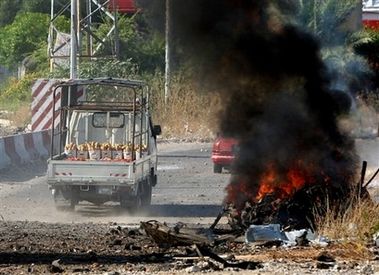Israeli tanks and soldiers were caught in vicious, close fighting with Hezbollah guerrillas across southern Lebanon today, even as the Israeli Government said it was delaying a major offensive that would reach up to 20 miles (32km) inside the country. Last night, a mile-long column of tanks and armoured bulldozers rolled across the border into Lebanon after Israel
Yesterday the Israeli army experienced its deadliest day in four weeks of fighting when 15 soldiers were killed, mostly by anti-tank missiles. Today, Israeli commanders did not comment on tank losses or casualties but reports that indicated that the worst fighting was taking place in the Khiam plain, an area of flat ground believed to be used as a rocket launching base.
To the north, helicopter gunships opened fire on buildings of the Beirut seafront, the first shelling of the centre of the Lebanese capital since Sheikh Hassan Nasrallah, the leader of Hezbollah, said further attacks on the heart of the city would lead to Hezbollah.
Rooftop aerials were destroyed and part of the roof of a historic lighthouse was blown apart. Leaflets gave warning of further attacks. In Tyre, Lebanese officials said a motorcyclist was killed by an Israeli rocket. In the eastern Bekaa Valley, a Hezbollah stronghold, an Israeli drone fired a missile into a minibus, killing one person and wounding 12, residents said.
Meanwhile the Israeli air force extended its ban on road travel to northern Lebanon for the first time. Leaflets were dropped near Tripoli, Lebanon’s second largest city, some 15 miles (25km) from the Syrian border and said that vehicles moving on the main coastal road would be bombed.
"Any pickup or truck of any kind moving on the coastal road as of 8pm (1800BST) will be attacked because it is suspected of carrying rockets, military hardware and saboteurs. You must know that anyone who moves in a pickup or truck is endangering his life," read the leaflet, which was signed, "The State of Israel."
Restrictions on movement within Lebanon, imposed by both Israel and Hezbollah, attracted the severe criticism of the UN’s top humanitarian official today, who said that aid could be delivered to 120,000 stranded Lebanese civilians if there was a pause in the fighting.
"The Hezbollah and the Israelis could give us access in a heartbeat," said Jan Egeland. "It is a disgrace really… We have not had any access for many days to the besieged population of southern Lebanon."
Today’s clashes came despite statements from Israeli officials that the major offensive approved by the Israeli security Cabinet yesterday would not begin until the weekend at the earliest, to allow for possible movement in the stalled diplomatic effort to end the crisis.
"There are diplomatic considerations," said Rafi Eitan, a former Israeli intelligence chief and the current Minister for Pensioners’ Affairs. "There is still a chance that an international force will arrive in the area. We have no interest in being in south Lebanon. We have an interest in peace on our borders."
Attempts to end the fighting are stalled over Israeli and Lebanese disagreements over the sequence of events that could lead to a ceasefire: Israel, backed by the US, refuses to stop fighting Hezbollah and withdraw from Lebanon until an international force arrives in the country. Lebanon, backed by France, wants an immediate ceasefire, followed by an Israeli withdrawal.
Despite broad Israeli public support for the war, the slow progress of the fighting and mounting casualties have led to frank criticism of the military operation, which has been unable to land decisive blows against Hezbollah.
Dissent within the Knesset and the Israeli Cabinet was laid bare by Shimon Peres, the former Prime Minister of Israel, and the Trade Minister, Eli Yishai, two of the three ministers to abstain during yesterday’s tense, six hour meeting on the war.
Mr Peres, now deputy Prime Minister, told Yediot Ahronoth, Israel’s best-selling daily newspaper, that Israel was likely to suffer 15 deaths a day if it continued its ground war.
"It is always possible to run to war but it is preferable to give a chance to the diplomatic channel. Fifteen victims a day is a proof of the price we are likely to pay if we don’t try to utilise the diplomatic process to the fullest," he said.
"At the moment it is preferable to wait and see if it is possible to achieve demands we asked Lebanon without exerting full military power."
Mr Yishai said he disagreed with the predictions made by Amir Peretz, the Defence Minister, who said that the planned operation to reach the Litani River, 20 miles (32km) inside Lebanon, would take a month and wipe out 70 to 80 per cent of Hezbollah’s military capabilities.
"I think it will take a lot longer," he said.
Meanwhile, Danny Yatom, a senior member of Mr Peretz’s Labor Party and a general in the reserves, said the expanded offensive was pointless: "We are banging our head against the wall," he told Israel TV’s Channel One. "And even if we reach the Litani, the Katyushas won’t stop."
Today the Israeli Finance Minister said the war had cost Israel $1.6 billion (£839 million) and that he would ask the Government to cut US$650 million (£341 million) from the 2006 state budget to help pay for it. Israel’s total budget for 2006 is US$56 billion (£29 billion).
 By Sam Knight and agencies,
By Sam Knight and agencies,


